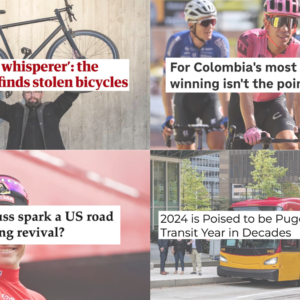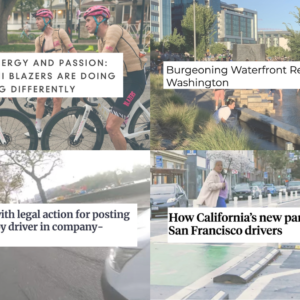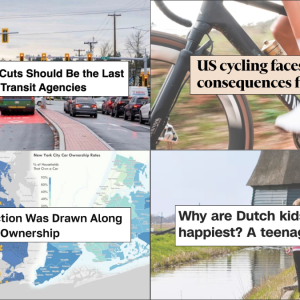Welcome to the week.
Here are the most notable stories our community came across in the past seven days…
Timur talks: One of the candidates I’m most excited about is Timur Ender who’s running in Dist 1 (East Portland). Don’t miss his recent interview on a local podcast. (Progress Portland)
‘Cross props: Portland’s very own Clara Honsinger (who nabbed bronze at a race in Belgium over the weekend) is featured prominently in this fun story on cyclocross from a major mainstream outlet. (Washington Post)
Crisis vs cautious: What is behind the (often) generational split between pro-housing and anti-housing environmentalists? It often comes down to age, economic status, and the urgency one feels for the threat of climate change. (The Atlantic)
Safe streets funding: Advocates in Los Angeles — where there were a whopping 330 traffic deaths last year — got a measure on the ballot that would fund bike and safety infrastructure that’s been too slow to get built. (LA Times Editorial Board)
NTOR is coming: Another mainstream article details the reasons for right-turn-on-red bans and why a lot of cities are contemplating them. We hear PBOT is considering it too, so stay tuned. (CNN)
Universal basic mobility: Los Angeles is giving 1,000 residents $150 to spend on transportation — but none of the money can go toward owning or operating a car. It’s similar to PBOT’s Transportaton Wallet program and the article says the idea is catching on “like wildfire”. (Next City)
Hop on one of these: A good rundown of 10 solid electric cargo bike options for folks that need to cart kids around. (Bike Mag)
Not just emissions: Latest numbers show that despite a shift away from gasoline, America’s driving habits have caused transportation emissions to go up — and a big contributor to the bad number is the carbon required in the manufacture of the (ever-larger) vehicles themselves. (Streetsblog USA)
Suck it, speeders!: The reasons folks in Bologna, Italy cite for being opposed to a new 30 km/hr speed limit are hilarious — “it makes me late” and “I’ll crash if I have to worry about the speedometer” — and help reveal why anti dangerous driving laws and enforcement are so desperately needed worldwide. (The Guardian)
Give up your keys: There’s a lot of ink spilled on old politicians these days. But older Americans behind the wheel of big cars is just as scary. A new movement to make it easier for folks to stop driving when they lose mental and physical acumen could be one answer to getting folks to give up the keys. (Washington Post)
Most walkable: Portland nabbed 5th in this ranking of the top 20 most walkable cities in America (behind Seattle!) according to a report from Smart Growth America. (Conde Nast Traveler)
Thanks to everyone who sent in links this week. The Monday Roundup is a community effort, so please feel free to send us any great stories you come across.








Thanks for reading.
BikePortland has served this community with independent community journalism since 2005. We rely on subscriptions from readers like you to survive. Your financial support is vital in keeping this valuable resource alive and well.
Please subscribe today to strengthen and expand our work.
Most Walkable: The ranking is out of 35 cities total, so anything ranked 18th+ is among the bottom half. Both LA and SF would have likely come out slightly higher had they not been watered-down by being combined with nearby suburban MSAs by the folks at Smart Growth.
The list is rather sad — Austin instance ranks #14, which is a very car oriented city outside of a small downtown area. Similar to bike network rankings, Portland comes up on top not because it is so incredible, but because most other American cities are just so much worse.
Basically any part of any US city that was white and built before 1950 will be highly walkable – anything afterwards will be a suburban hell with few if any sidewalks – while older black parts of town “on the other side of the tracks” may or may not have sidewalks, and will be poorly maintained in any case, with badly beat up city streets. Most cities didn’t restart sidewalk programs until after 1990…
Most walkable: The ranking is based on two indices — one of which is by the American Enterprise Institute: https://www.aei.org/wod/
It is interesting to read their endorsement for more walkable neighborhoods, very different from the “I own the road” ideology.
It’s tough to follow up on your Monday roundup suggestions when they lead to a paywall.
Archive.org and Archive.today are useful sites for getting around paywalls. I use them all the time; just paste the URL of the article you want to read into the search bar.